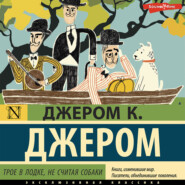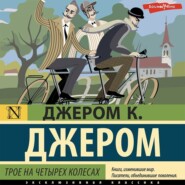По всем вопросам обращайтесь на: info@litportal.ru
(©) 2003-2024.
✖
They and I
Настройки чтения
Размер шрифта
Высота строк
Поля
Robina broke down, and acknowledged she had been a wicked girl. If the cow died, so she said, she should never forgive herself. Veronica at this burst into tears also; and the cow, whether moved afresh by her own troubles or by theirs, commenced again to bellow. I was fortunately able to find an elderly labourer smoking a pipe and eating bacon underneath a tree; and with him I bargained that for a shilling a day he should milk the cow till further notice.
We left him busy, and returned to the cottage. Dick met us at the door with a cheery “Good morning.” He wanted to know if we had heard the storm. He also wanted to know when breakfast would be ready. Robina thought that happy event would be shortly after he had boiled the kettle and made the tea and fried the bacon, while Veronica was laying the table.
“But I thought – ”
Robina said that if he dared to mention the word “household-fairy” she would box his ears, and go straight up to bed, and leave everybody to do everything. She said she meant it.
Dick has one virtue: it is philosophy. “Come on, young ’un,” said Dick to Veronica. “Trouble is good for us all.”
“Some of us,” said Veronica, “it makes bitter.”
We sat down to breakfast at eight-thirty.
CHAPTER IV
Our architect arrived on Friday afternoon, or rather, his assistant.
I felt from the first I was going to like him. He is shy, and that, of course, makes him appear awkward. But, as I explained to Robina, it is the shy young men who, generally speaking, turn out best: few men could have been more painfully shy up to twenty-five than myself.
Robina said that was different: in the case of an author it did not matter. Robina’s attitude towards the literary profession would not annoy me so much were it not typical. To be a literary man is, in Robina’s opinion, to be a licensed idiot. It was only a week or two ago that I overheard from my study window a conversation between Veronica and Robina upon this very point. Veronica’s eye had caught something lying on the grass. I could not myself see what it was, in consequence of an intervening laurel bush. Veronica stooped down and examined it with care. The next instant, uttering a piercing whoop, she leapt into the air; then, clapping her hands, began to dance. Her face was radiant with a holy joy. Robina, passing near, stopped and demanded explanation.
“Pa’s tennis racket!” shouted Veronica – Veronica never sees the use of talking in an ordinary tone of voice when shouting will do just as well. She continued clapping her hands and taking little bounds into the air.
“Well, what are you going on like that for?” asked Robina. “It hasn’t bit you, has it?”
“It’s been out all night in the wet,” shouted Veronica. “He forgot to bring it in.”
“You wicked child!” said Robina severely. “It’s nothing to be pleased about.”
“Yes, it is,” explained Veronica. “I thought at first it was mine. Oh, wouldn’t there have been a talk about it, if it had been! Oh my! wouldn’t there have been a row!” She settled down to a steady rhythmic dance, suggestive of a Greek chorus expressing satisfaction with the gods.
Robina seized her by the shoulders and shook her back into herself. “If it had been yours,” said Robina, “you would deserve to have been sent to bed.”
“Well, then, why don’t he go to bed?” argued Veronica.
Robina took her by the arm and walked her up and down just underneath my window. I listened, because the conversation interested me.
“Pa, as I am always explaining to you,” said Robina, “is a literary man. He cannot help forgetting things.”
“Well, I can’t help forgetting things,” insisted Veronica.
“You find it hard,” explained Robina kindly; “but if you keep on trying you will succeed. You will get more thoughtful. I used to be forgetful and do foolish things once, when I was a little girl.”
“Good thing for us if we was all literary,” suggested Veronica.
“If we ‘were’ all literary,” Robina corrected her. “But you see we are not. You and I and Dick, we are just ordinary mortals. We must try and think, and be sensible. In the same way, when Pa gets excited and raves – I mean, seems to rave – it’s the literary temperament. He can’t help it.”
“Can’t you help doing anything when you are literary?” asked Veronica.
“There’s a good deal you can’t help,” answered Robina. “It isn’t fair to judge them by the ordinary standard.”
They drifted towards the kitchen garden – it was the time of strawberries – and the remainder of the talk I lost. I noticed that for some days afterwards Veronica displayed a tendency to shutting herself up in the schoolroom with a copybook, and that lead pencils had a way of disappearing from my desk. One in particular that had suited me I determined if possible to recover. A subtle instinct guided me to Veronica’s sanctum. I found her thoughtfully sucking it. She explained to me that she was writing a little play.
“You get things from your father, don’t you?” she enquired of me.
“You do,” I admitted; “but you ought not to take them without asking. I am always telling you of it. That pencil is the only one I can write with.”
“I didn’t mean the pencil,” explained Veronica. “I was wondering if I had got your literary temper.”
It is puzzling, when you come to think of it, this estimate accorded by the general public to the littérateur. It stands to reason that the man who writes books, explaining everything and putting everybody right, must be himself an exceptionally clever man; else how could he do it! The thing is pure logic. Yet to listen to Robina and her like you might think we had not sense enough to run ourselves, as the saying is – let alone running the universe. If I would let her, Robina would sit and give me information by the hour.
“The ordinary girl.. ” Robina will begin, with the air of a University Extension Lecturer.
It is so exasperating. As if I did not know all there is to be known about girls! Why, it is my business. I point this out to Robina.
“Yes, I know,” Robina will answer sweetly. “But I was meaning the real girl.”
It would make not the slightest difference were I even quite a high-class literary man – Robina thinks I am: she is a dear child. Were I Shakespeare himself, and could I in consequence say to her: “Methinks, child, the creator of Ophelia and Juliet, and Rosamund and Beatrice, must surely know something about girls,” Robina would still make answer:
“Of course, Pa dear. Everybody knows how clever you are. But I was thinking for the moment of real girls.”
I wonder to myself sometimes, Is literature to the general reader ever anything more than a fairy-tale? We write with our heart’s blood, as we put it. We ask our conscience, Is it right thus to lay bare the secrets of our souls? The general reader does not grasp that we are writing with our heart’s blood: to him it is just ink. He does not believe we are laying bare the secrets of our souls: he takes it we are just pretending. “Once upon a time there lived a girl named Angelina who loved a party by the name of Edwin.” He imagines – he, the general reader – when we tell him all the wonderful thoughts that were inside Angelina, that it was we who put them there. He does not know, he will not try to understand, that Angelina is in reality more real than is Miss Jones, who rides up every morning in the ’bus with him, and has a pretty knack of rendering conversation about the weather novel and suggestive. As a boy I won some popularity among my schoolmates as a teller of stories. One afternoon, to a small collection with whom I was homing across Regent’s Park, I told the story of a beautiful Princess. But she was not the ordinary Princess. She would not behave as a Princess should. I could not help it. The others heard only my voice, but I was listening to the wind. She thought she loved the Prince – until he had wounded the Dragon unto death and had carried her away into the wood. Then, while the Prince lay sleeping, she heard the Dragon calling to her in its pain, and crept back to where it lay bleeding, and put her arms about its scaly neck and kissed it; and that healed it. I was hoping myself that at this point it would turn into a prince itself, but it didn’t; it just remained a dragon – so the wind said. Yet the Princess loved it: it wasn’t half a bad dragon, when you knew it. I could not tell them what became of the Prince: the wind didn’t seem to care a hang about the Prince.
Myself, I liked the story, but Hocker, who was a Fifth Form boy, voicing our little public, said it was rot, so far, and that I had got to hurry up and finish things rightly.
“But that is all,” I told them.
“No, it isn’t,” said Hocker. “She’s got to marry the Prince in the end. He’ll have to kill the Dragon again; and mind he does it properly this time. Whoever heard of a Princess leaving a Prince for a Dragon!”
“But she wasn’t the ordinary sort of Princess,” I argued.
“Then she’s got to be,” criticised Hocker. “Don’t you give yourself so many airs. You make her marry the Prince, and be slippy about it. I’ve got to catch the four-fifteen from Chalk Farm station.”
“But she didn’t,” I persisted obstinately. “She married the Dragon and lived happy ever afterwards.”
Hocker adopted sterner measures. He seized my arm and twisted it behind me.
“She married who?” demanded Hocker: grammar was not Hocker’s strong point.
“The Dragon,” I growled.
“She married who?” repeated Hocker.
“The Dragon,” I whined.
“She married who?” for the third time urged Hocker.
Hocker was strong, and the tears were forcing themselves into my eyes in spite of me. So the Princess in return for healing the Dragon made it promise to reform. It went back with her to the Prince, and made itself generally useful to both of them for the rest of the tour. And the Prince took the Princess home with him and married her; and the Dragon died and was buried. The others liked the story better, but I hated it; and the wind sighed and died away.

















